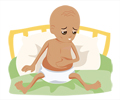Over 37 million Americans are poorer this year, nearly 46 million have no health insurance, while children bear a high proportion of the burden, an official report showed Tuesday.
Highlighting key issues in the race for the presidency, an annual report by the Census Bureau showed that some 37.3 million Americans lived in poverty in the United States in 2007, an increase from the 36.5 million people in 2006.While the numbers of poor people rose, numbers without health insurance paradoxically fell to 45.7 million people in 2007 from 47 million in 2006, the "Income, Poverty and Health Insurance Coverage Report" showed.
But the decline in numbers of Americans who make do without health insurance gave little cause for optimism, and the poverty statistics were based on a flawed point of departure, experts said.
"What the report shows is that there has been some change but it's pretty minor," said Paul Fronstin, a senior research associate at the Employee Benefits Research Institute.
"This isn't progress. The changes are insignificant and we would need to see this happen for 10 years to say there has been progress," he said.
"If you look at the numbers, there's bad news in the story," said Kathleen Stoll, deputy executive director of Families USA, a non-profit group that advocates for high-quality, affordable healthcare for Americans.
Advertisement
The Census Bureau report showed that the percentage of Americans covered by government health insurance rose to 83 million last year from 80 million in 2006, or, in percentage terms, to 27.8 percent from 27.0 percent.
Advertisement
The poverty threshold is currently set at 21,000 dollars (14,360 euros) for a family of four, but experts lamented that the 1960s-set standard was out of date.
"It doesn't capture what it costs to meet some of a family's basic necessities," said Stoll.
"Even using those low standards, more families, especially with children, are sliding into poverty and becoming eligible for public programs," she said.
Mike Laracy of the Casey Foundation, a non-profit group that tries to lift families out of poverty, also called for the poverty measure to be updated.
"It still assumes that American families spend about one-third of their budget on food, but what's really punishing American families are housing and energy costs," Laracy said.
Poverty hits American children disproportionately hard, with 18 percent of under-18s living below the poverty threshold, compared with 11 percent of adults aged 18-64, and just under 10 percent of senior citizens.
Children of poor families are more likely to be placed in care or to fail to achieve academic standards, said Laracy.
Poor children are also more likely to be uninsured, according to the Census Bureau report, which is based on data gathered last year for the American Community Survey (ACS) and the Current Population Survey (CPS) -- before the downturn in the US economy.
That gave another reason for the experts to mute their cheers over the report.
"By every measure, 2008 is going to be worse. Clearly, there are going to be increasing problems, growth in poverty and higher unemployment especially among unskilled workers," said Rebecca Blank, a senior fellow at the Brookings Institution think-tank and a co-director of the National Poverty Center.
An overwhelming majority of Americans -- 82 percent -- want the health care system completely overhauled, and nine out of 10 Americans want the 2008 presidential candidates to address health care reform, a survey released this month by the Commonwealth Fund showed.
Poverty is also high on the list of concerns of Americans, who "want to hear what their political leaders are going to do to reduce it," said Laracy.
"As more Americans struggle to make ends meet, we have seen a growing willingness among political leaders from both parties to talk about how to come up with concrete and workable solutions," he said.
Source-AFP
THK/L









